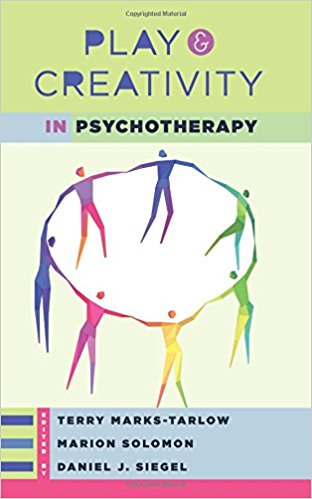
Play & Creativity in Psychotherapy
By
Terry Marks-Tarlow, Marion Solomon, and Daniel J. Siegel
Reviewed by Henry Reed
To some of us, the ability to play is the number one symptom of being healthy and alive. Impediments to being able to play are psychological indicators of stress, inhibition, and less than ideal functioning. It's hard to believe. We are such an achievement oriented society. Play seems irresponsible. That's ignorance and prejudice speaking. That a professional book needs to come out and state to psychotherapists that play is healthy is a sure symptom of distress in the psychotherapy industry. Ever since health insurance has taken over psychotherapy, the need to document treatments, hour by hour, against progress made in being productive, has shrunk the shrink industry's sense of its own intuitive guidance. Instead, they orient to the paperwork--how shall I document today's treatment?
This book is full of professional, scientific, practical information regarding the crucial importance of play in being well and healthy, resilient to challenges. It stands in objective contrast to the opinion that playing is a waste of time. I encourage readers to check out the table of contents to discover the various specific ways in which play therapy can make a big difference.
We claim that the doctors don't do the healing, nature does. What the doctor does is to prepare the patient for nature's operation. Play can be very ambiguous, hard to pin down into elements of labor producing elements of progress or production. We look to outcomes, and ignore the process. For some adults, discovering that they can indeed play comes as a healing shock. Freedom from the jail of shoulds and expectations. If nature is to do the healing, then the patient must play, for nature plays.
When therapists philosophize, and speculate about the eternals of human existence, rather than the practicalities of today's challenges to behaviors and habits, the eternal verities return to the discussion. True, we need to eat in order to live, but we don't live in order to eat--we live to play! Everyone is born ready and feeling entitled to explore what life brings out in them as they play along. Unfortunately, the grown ups have been spoiled and begin to spoil the kids. That will provide future income for psychotherapists. Health insurance going out the window, we'll need a new basis for supporting psychotherapists who wish to save us through play!
Seriously, though, no playing around, these folks are making important suggestions regarding the importance of play. Buy a copy and send it to your insurance company! Therapists would love to play with you; they just have to document it and rationalize it in order to get paid. This book will help a lot!
To explore Play and Creativity in Psychotherapy at Amazon.com, click here!
From the Publisher (Norton):
The contents